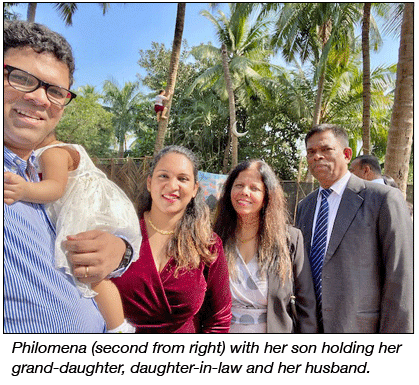|
In Mumbai, India Philomena Pereira, Managing
Director, P.V. Agencies Freight Forwarders Pvt Ltd (Customs Broker), Director,
Grace Global Logistics (multimodal transport operator) and Partner, BBB
Speed Services (a transport company) has seen it all.
In the logistics and forwarding business
for quite a few years, Pereira has helped break through what women have
collectively smashed to smithereens—the glass ceiling, by approaching
our male-dominated transportation industry with unusual skill, including
having her priorities straight about what women have to go through –
at home and at work.
Here Philomena sets aside the business pitch,
although her enterprises in all aspects of logistics underscore her dynamic
leadership role.
Women’s issues are the topic as Philomena
speaks out about the state of women up and down the line across the sub-continent
brought forward by the impact of COVID-19.
Opportunity Knocks
“The pandemic,” Philomena declared,”
has led businesses to explore and adopt technology as a substitute to
manpower.
“The processes which required people
to visit their offices now has advanced for many electronically.
“Also, the government – where
once human interaction was required – has advanced exponentially
to the digital platform.
“Faceless, digitization has progressed
much faster than expected.
“This has resulted in human resources
especially women seeing some opportunities in securing dynamic and challenging
roles.”
The Balancing Act
 “Women
have held the fort as true martyrs. “Women
have held the fort as true martyrs.
“Household help were restricted entry
to homes or in some places totally banned for a quite a long period of
time because of the pandemic.
“A few of us women took it upon ourselves
to complete our chores and have ended up breaking our backs after a few
months.
“With children and husbands being
at home, it has been difficult for the women.
“They have had to stretch themselves
far and beyond to maintain peace in their homes.
“Also, space constraints in their
homes for all the family members to be awake and kicking through the day
has been a challenge for the women, yet most of them have endured the
test of patience.
“Some women with small or school-going
kids had to give up jobs because they were required to be with them all
through their online lessons.
“Worse, In India at least, since women
were at home, in-laws (grandparents, for example) refused to look after
the children.”
When Women Farmers Protest Change
Is Going To Come
“As example presently, in the rural
areas it has been observed that most of the men migrated to cities to
work in factories or do other jobs.
“Therefore, especially in rural areas,
the women work in the fields.
“The thing is these women do have
some level of education or exposure to others in our society who will
support them in their protest.
“Make no mistake, when women take
up a challenge, they will persist until they see some success.
“Those in authority must come to an
amicable closure to this protest.
“India’s Farmers should be considered
seriously because they have suffered and continue to suffer due to drought,
floods, inadequate inputs leading to yield gaps, absence of markets to
sell their produce.
“Government should take serious steps
to take up these projects.
“Also, the women who are educated
and residing in the same areas should be encouraged to take up these projects,
to support their fellow womenfolk. They will contribute in bringing about
the change.”
The Major Challenges For India’s
Women at Work
“Generally,” Philomena asserts,”
women are not preferred over men knowing their dedication to their families
and also the inherent nature of most women that they do not compromise
and accept help by others.
“Also, it must be said, some women
have made their household members so dependent on themselves instead of
making them self-reliant and involving them in household chores.
“Women should stop considering their
jobs/services less important and ensure they work on a timeline whether
at home or work.”
India Violence Skyrockets Against
Women
“First, importance has to be given
to education of women, especially in rural areas.
“Women should be provided incentives
to attend school.
“Men and women should be at equal
levels.
“Our women should be involved in the
decisions affecting the family.
“There also needs to be a widespread
educational effort directed at empowering women, including something as
basic as managing a bank account.
“It may seem unbelievable in 2021,
but millions of Indian women don’t have their own personal savings
account, and that is something that should be an essential.”
Tirthankar Ghosh
|




